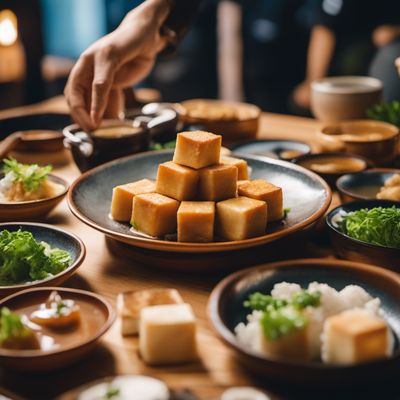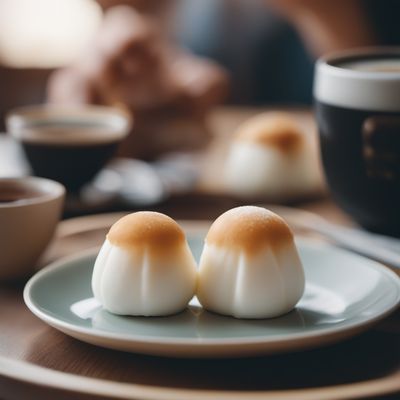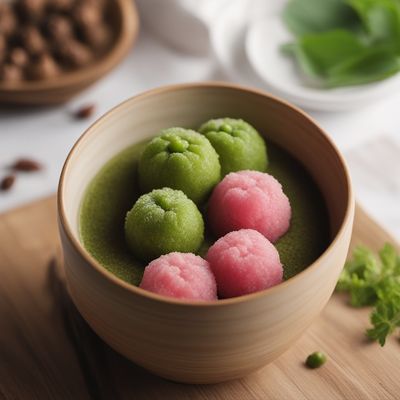
Recipe
Madrid-style Shabu-shabu
Sizzling Spanish Shabu-shabu: A Fusion of Flavors
4.8 out of 5
Indulge in the vibrant flavors of Madrid with this unique twist on the traditional Japanese dish, Shabu-shabu. Madrid-style Shabu-shabu combines the essence of Japanese hot pot with the bold and savory ingredients of Madrid cuisine, resulting in a delightful fusion of flavors.
Metadata
Preparation time
20 minutes
Cooking time
15 minutes
Total time
35 minutes
Yields
4 servings
Preparation difficulty
Easy
Suitable for
Low-carb, Gluten-free, Dairy-free, Paleo, Keto
Allergens
N/A
Not suitable for
Vegan, Vegetarian, Pescatarian, Nut-free, Egg-free
Ingredients
Madrid-style Shabu-shabu differs from the original Japanese version by incorporating Spanish spices and flavors into the broth. The traditional Japanese hot pot is typically served with a soy-based dipping sauce, while the Madrid-style version focuses on a rich and aromatic broth that is infused with Spanish spices. Additionally, the choice of vegetables may vary to include local produce commonly found in Madrid cuisine. We alse have the original recipe for Shabu-shabu, so you can check it out.
-
500g (1.1 lb) thinly sliced beef 500g (1.1 lb) thinly sliced beef
-
1 onion, thinly sliced 1 onion, thinly sliced
-
2 carrots, thinly sliced 2 carrots, thinly sliced
-
1 red bell pepper, thinly sliced 1 red bell pepper, thinly sliced
-
200g (7 oz) mushrooms, sliced 200g (7 oz) mushrooms, sliced
-
4 cups (950ml) beef broth 4 cups (950ml) beef broth
-
2 cloves of garlic, minced 2 cloves of garlic, minced
-
1 teaspoon smoked paprika 1 teaspoon smoked paprika
-
1 teaspoon cumin 1 teaspoon cumin
-
1 teaspoon dried oregano 1 teaspoon dried oregano
-
Salt and pepper to taste Salt and pepper to taste
-
Olive oil for cooking Olive oil for cooking
Nutrition
- Calories (kcal / KJ): 350 kcal / 1465 KJ
- Fat (total, saturated): 15g, 5g
- Carbohydrates (total, sugars): 10g, 5g
- Protein: 40g
- Fiber: 3g
- Salt: 2g
Preparation
-
1.In a large pot, heat olive oil over medium heat. Add minced garlic and sauté until fragrant.
-
2.Add the sliced onion, carrots, and red bell pepper to the pot. Cook until the vegetables are slightly softened.
-
3.Sprinkle smoked paprika, cumin, dried oregano, salt, and pepper over the vegetables. Stir well to coat the vegetables with the spices.
-
4.Pour the beef broth into the pot and bring it to a simmer.
-
5.Add the sliced mushrooms and simmer for another 5 minutes.
-
6.Arrange the thinly sliced beef on a platter.
-
7.To serve, bring the pot of broth and vegetables to the table. Each diner can then dip the beef slices into the simmering broth for a few seconds until cooked to their desired doneness.
-
8.Serve the cooked beef with the vegetables and broth.
Treat your ingredients with care...
- Beef — Choose thinly sliced beef suitable for hot pot cooking, such as ribeye or sirloin. For a more tender result, briefly freeze the beef before slicing it thinly.
- Smoked paprika — Use a good quality smoked paprika to add a distinct Spanish flavor to the broth.
- Cumin — Toasting the cumin seeds before grinding them will enhance their aroma and flavor.
- Mushrooms — Opt for a mix of mushrooms like cremini, shiitake, and oyster mushrooms to add depth to the broth.
- Olive oil — Extra virgin olive oil is recommended for its rich flavor.
Tips & Tricks
- For added flavor, you can serve Madrid-style Shabu-shabu with a side of Spanish aioli or romesco sauce.
- Experiment with different vegetables based on seasonal availability to add variety to the dish.
- To make the meal heartier, serve the Shabu-shabu with a side of crusty bread or Spanish rice.
- Customize the spice level by adjusting the amount of smoked paprika and cumin according to your preference.
- Don't overcook the beef slices to maintain their tenderness and juiciness.
Serving advice
Serve Madrid-style Shabu-shabu as a communal dish, allowing each diner to cook their own beef slices in the simmering broth. Provide individual dipping bowls for the cooked beef and vegetables. Accompany the meal with steamed rice or crusty bread.
Presentation advice
Present the thinly sliced beef, vibrant vegetables, and aromatic broth in a large, decorative pot at the center of the table. Garnish with fresh herbs like parsley or cilantro for a pop of color. Serve the dish with elegant chopsticks and individual dipping bowls for an authentic dining experience.
More recipes...
For Shabu-shabu
For Japanese cuisine » Browse all
More Japanese cuisine dishes » Browse all

Agedashi tofu
Deep Fried Tofu with Dashi Sauce
Agedashi tofu is a traditional Japanese dish that is full of flavor and nutrition. It is a staple in many Japanese households and is enjoyed by...

Karukan
Karukan is a traditional Japanese sweet that is made with sweet potato and rice flour. It is a popular snack in Japan and is often served with green tea.

Coffee daifuku
Coffee daifuku is a Japanese sweet made with mochi and a coffee-flavored filling.







